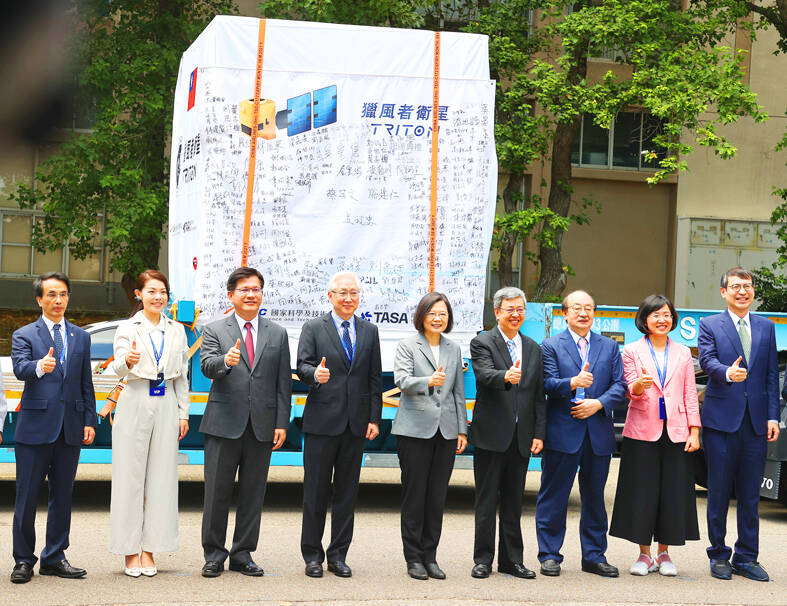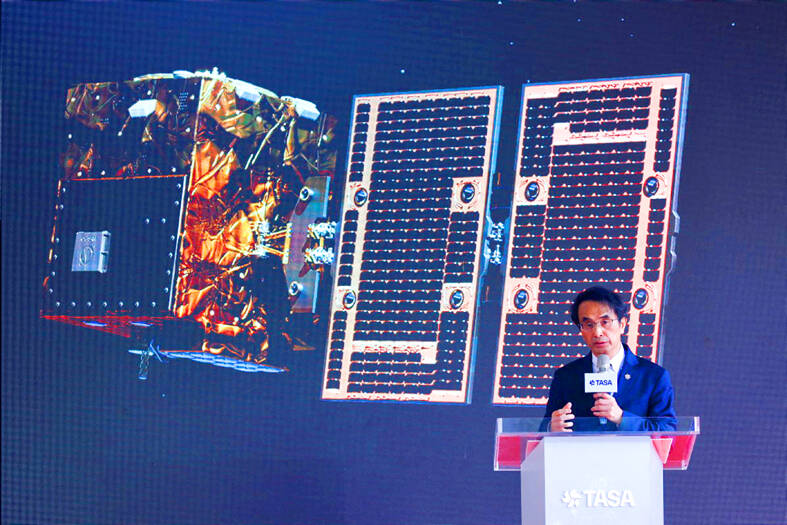Taiwan flagged its space ambition as President Tsai Ing-wen (蔡英文) yesterday marked the departure of the nation’s first indigenously engineered weather satellite from the Taiwan Space Agency at an event at the Hsinchu Science Park.
While Taiwan has since the 1990s had a satellite program, called Formosat, tensions with China have given the government extra impetus, with plans to use satellites in medium and low Earth orbit for Internet services that would be a backup in the event that China severed undersea cables or other communication links.
The Triton satellite — or Wind Hunter (獵風者) — is being shipped to French Guiana, where it is to be launched on an Arianespace Vega rocket in September.

Photo: CNA
“The Wind Hunter satellite was born and bred in Taiwan,” Tsai said, adding that almost everything about the spacecraft, from conceptual design to manufacturing, was done in Taiwan.
“The Wind Hunter proves that with the advantages of Taiwan’s semiconductor and precision manufacturing, the nation is absolutely capable of entering the global space industry,” she said.
The satellite shows Taiwan’s determination to develop a space industry and participate in the space age, she said.

Photo: Ann Wang, Reuters
Triton is to be put into a circular low Earth orbit at an altitude of about 550km to 650km, the Taiwan Space Agency said.
It is to collect sea-surface wind data that would be combined with ground radar wind field data to better predict heavy rain and the paths of typhoons.
Taiwan Space Agency Director-General Wu Jong-shinn (吳宗信) said that Triton was initially planned to be one of the satellites making up the Formosat-7 constellation before being retasked following structural changes to the nation’s space program.
The changes meant that Triton would be made almost entirely in Taiwan in a move aimed at bolstering the domestic aerospace industry, Wu said, adding that research and development for Triton began in 2014.
Eighty-three percent of its key components were manufactured domestically, showing how much the nation’s spacecraft research and development capabilities have improved, he said.
Triton’s launch would be a boon to the global meteorological community, as many satellites have been retired in the past few years, he said.
The commercialization of space exploration began a mere four years ago and the nation has kept pace with progress in the sector, National Science and Technology Council Minister Wu Tsung-tsong (吳政忠) said.
In May, the US National Oceanic and Atmospheric Administration sent a delegation to Taiwan and expressed interest in collaborative efforts involving Triton, he said, adding that meteorological satellites are highly versatile.

CHAOS: Iranians took to the streets playing celebratory music after reports of Khamenei’s death on Saturday, while mourners also gathered in Tehran yesterday Iranian Supreme Leader Ayatollah Ali Khamenei was killed in a major attack on Iran launched by Israel and the US, throwing the future of the Islamic republic into doubt and raising the risk of regional instability. Iranian state television and the state-run IRNA news agency announced the 86-year-old’s death early yesterday. US President Donald Trump said it gave Iranians their “greatest chance” to “take back” their country. The announcements came after a joint US and Israeli aerial bombardment that targeted Iranian military and governmental sites. Trump said the “heavy and pinpoint bombing” would continue through the week or as long

TRUST: The KMT said it respected the US’ timing and considerations, and hoped it would continue to honor its commitments to helping Taiwan bolster its defenses and deterrence US President Donald Trump is delaying a multibillion-dollar arms sale to Taiwan to ensure his visit to Beijing is successful, a New York Times report said. The weapons sales package has stalled in the US Department of State, the report said, citing US officials it did not identify. The White House has told agencies not to push forward ahead of Trump’s meeting with Chinese President Xi Jinping (習近平), it said. The two last month held a phone call to discuss trade and geopolitical flashpoints ahead of the summit. Xi raised the Taiwan issue and urged the US to handle arms sales to

BIG SPENDERS: Foreign investors bought the most Taiwan equities since 2005, signaling confidence that an AI boom would continue to benefit chipmakers Taiwan Semiconductor Manufacturing Co’s (TSMC, 台積電) market capitalization swelled to US$2 trillion for the first time following a 4.25 percent rally in its American depositary receipts (ADR) overnight, putting the world’s biggest contract chipmaker sixth on the list of the world’s biggest companies by market capitalization, just behind Amazon.com Inc. The site CompaniesMarketcap.com ranked TSMC ahead of Saudi Aramco and Meta Platforms Inc. The Taiwanese company’s ADRs on Tuesday surged to US$385.75 on the New York Stock Exchange, as strong demand for artificial intelligence (AI) applications led to chip supply constraints and boost revenue growth to record-breaking levels. Each TSMC ADR represents

Pro-democracy media tycoon Jimmy Lai’s (黎智英) fraud conviction and prison sentence were yesterday overturned by a Hong Kong court, in a surprise legal decision that comes soon after Lai was jailed for 20 years on a separate national security charge. Judges Jeremy Poon (潘兆初), Anthea Pang (彭寶琴) and Derek Pang (彭偉昌) said in the judgement that they allowed the appeal from Lai, and another defendant in the case, to proceed, as a lower court judge had “erred.” “The Court of Appeal gave them leave to appeal against their conviction, allowed their appeals, quashed the convictions and set aside the sentences,” the judges